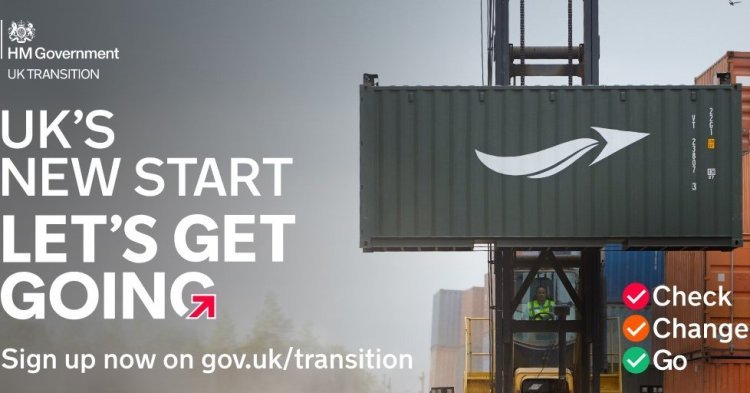The campaign carries the strapline “Check, Change, Go” (which will bear haunting similarities to the “See it, Say it, Sort it” tricolon to any frequenter of UK public transport) and refers the viewer to the address gov.uk/transition. What is to be checked and changed? The amount of disruption you will face after December 31st is the short answer.
The backdrop to this campaign is that in June the UK government announced it would not seek an extension to the year-long transition period and passed the deadline to do so. This means that regardless of the fact that the UK is currently going through its worst economic crisis since the 1930s, the UK has until December to hash out a trade deal with its biggest partner, the European Union.
Negotiations have not been easy and both sides have lamented the inability of the other to compromise over a variety of issues, from fishery rights to the role of the European Court of Justice and competition rules. Prior to the sixth round of negotiations that resumed again last week, a spokesperson for the Prime Minister on Monday promised to “continue to engage constructively” whilst proclaiming the UK would “not give up [its] rights as a sovereign state”. However on Thursday, Michel Barnier, the EU’s chief negotiator, called a breakthrough ‘at this point unlikely.’ The Prime Minister’s office ambivalently stated there had neither been a ‘breakthrough nor a breakdown.’ Ultimately the meeting ended without an agreement. Michel Barnier and his UK counterpart David Frost, are set to have informal talks next week and have another round of negotiations pencilled in for August.
Check, Change, Go
On the surface, the government’s campaign seems quite sensible. There has been raging insecurity for years over the UK’s future trade relationship with the EU and what businesses and individuals will need to do in preparation. It also sounds rather straightforward – people should check what they need to do, make the necessary changes and go off on their merry way. However, reality takes little heed of political slogans.
For holiday-makers, the advice is simple if inconvenient. There are cautions surrounding phone bills whilst travelling, which are likely to become more costly as the UK exits the EU’s free data roaming scheme. There are recommendations to get travel insurance that covers healthcare, which was previously covered through the European Health Insurance Card. Bringing pets along will become more difficult and driving documents have the potential to cause headaches. If you are travelling on business, there is reference to “more things to do.”
For companies doing business with the EU, things are more complicated. When importing and exporting goods, you will need to make customs declarations. To help with this paperwork you are encouraged to hire a customs agent or freight forwarder. Rules governing the type of goods you trade in may also change, opening a Pandora’s box of licenses, certificates, marketing standards, and labelling. As an importer/exporter you will have to apply for an Economic Registration and Identification Number (EORI). If you already have one? Great! You just have to reapply to get one starting with ‘GB’. Customs duties and VAT will add to the costs. At first this does not look too bad – just your regular paperwork-party. But this preparation will need to be ready to work seamlessly on January 1st 2021. For businesses that have been squeezed by COVID-19, the money required for preparation is in short supply
Check Again
In all these steps and recommendations, however, there is no reference to a “No-deal” scenario. Despite having declared Brexit-victory in January, the clouds of “No-deal” once again loom. Previously, this referred to the UK “crashing out” of the EU without a withdrawal agreement. Now, it refers to the UK ending the transition period without a trade deal in place.
The prospects of a “No-deal” outcome are becoming increasingly likely again. On July 22nd, it was reported that government officials were preparing for either a “No-deal” scenario or only a “basic agreement” with the EU by autumn given the low prospects for an agreement during the current round of negotiations. Supposedly, the government was making preparations to revert to World Trade Organisation (WTO) terms for the post-transition period.
However, reverting to WTO terms itself (like so much in this process) is not as straightforward as it sounds, and involves negotiations and procedures in the WTO as well as masses of domestic legislation.
Even without that, there would be hiccups. In the WTO, each country has a set of tariffs and quotas for countries with which they have no Free Trade Agreement. For the EU, these are generally low. However, for some goods, such as cars (10%) and dairy products (up to 35%) they are considerably higher and would bode ill for EU-UK trade. The UK itself has pledged to get rid of what it is calling ‘nuisance tariffs’ (that is to say, lower tariffs) which is set to make 47% of all products tariff-free (vs 27% when it was part of the EU). This gives the impression of comparatively freer trade. However, if one considers that 46% of UK exports in 2018 went to the EU as part of the single market and unencumbered by tariffs, things look a little less rosy.
Add to that the myriad of non-tariff boundaries, from product standards to safety and sanitary checks that would suddenly apply and pose even greater barriers to trade. Without a trade deal between the EU and UK, it would take considerable time and effort for businesses to find ways to work with the new regulations that could spring up overnight.
It should also be noted that the UK will need to hash out new trade deals with all its other partners. Whilst it is true that the EU did not have FTAs with (for example) the US, China, Brazil and Australia and thus the UK was technically trading with them under WTO rules, the EU did have numerous agreements with each partner (at least 20 with the US, for example) that facilitated trade.
Let’s Get it Over With
Conspicuously absent from the new PR campaign is any mention of the word ‘Brexit.’ In the eyes of the Prime Minister, the B-word was victoriously declared over in January, when the UK formally left the European Union. Now over four years after the Brexit referendum, it is painfully apparent that the process is far from over. The coronavirus has left the UK with the third-highest death toll in the world and will likely cause untold economic damage. At the same time, the UK is hastily trying to negotiate a Free Trade Agreement with the economic bloc it just left to prevent even more economic chaos. Given that, “UK’s New Start” sounds positively Orwellian.
To prevent the impending economic contraction from significantly worsening, compromises will be necessary. Talk of compromise to clinch a deal in the tight schedule has been lacking throughout this process as the government has teetered towards a “no-deal” scenario with characteristic bravado.
However, if the tortuous path to a withdrawal agreement was anything to go by, it is possible a last-minute agreement will eventually be reached. As we enter the seventh round of negotiations, it is perhaps appropriate to take a leaf out of Number 10’s book: Let’s Get it Over With.


Follow the comments: |
|
